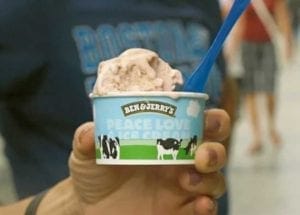 Former Vermont gubernatorial candidate James Ehlers alleged claims of breach of express warranty, unjust enrichment, and violations of Vermont’s consumer protection law against the ice cream manufacturer, Ben & Jerry’s, and its parent company, Unilever, in a complaint filed in October in the U.S. District Court in Burlington. Ehlers based these claims on allegations that Ben & Jerry’s misleads its consumers by stating its dairy products come from “happy cows” on “caring dairy farms.” The complaint alleges that only a portion of the dairy products come from the Vermont manufacturer’s “Caring Dairy” program, and that the rest is sourced from mass-producing dairy operations. A separate lawsuit filed in 2018 by the Organic Consumers Association against Ben & Jerry’s alleged deceptive marketing and labeling also based on the “happy cows” and “caring dairies” claims made on Ben & Jerry’s packaging.
Former Vermont gubernatorial candidate James Ehlers alleged claims of breach of express warranty, unjust enrichment, and violations of Vermont’s consumer protection law against the ice cream manufacturer, Ben & Jerry’s, and its parent company, Unilever, in a complaint filed in October in the U.S. District Court in Burlington. Ehlers based these claims on allegations that Ben & Jerry’s misleads its consumers by stating its dairy products come from “happy cows” on “caring dairy farms.” The complaint alleges that only a portion of the dairy products come from the Vermont manufacturer’s “Caring Dairy” program, and that the rest is sourced from mass-producing dairy operations. A separate lawsuit filed in 2018 by the Organic Consumers Association against Ben & Jerry’s alleged deceptive marketing and labeling also based on the “happy cows” and “caring dairies” claims made on Ben & Jerry’s packaging.
Consumer protection laws, like Vermont’s Consumer Protection Act are enacted to protect consumers from unfair, deceptive, or misleading practices by businesses. Both state and federal laws provide protection for consumers and opportunities for relief when businesses violate those laws. While it may seem trivial to argue whether the characterization of a “happy cow” is enough to be considered an unfair or deceptive practice, companies like Ben & Jerry’s have been building a reputation for humane and sustainable practices to build trust with consumers. False advertisement is one example of an unfair or deceptive practice by a business. However, for a claim of a violation of a consumer protection law to succeed, it must be proven that the misrepresentation was material. In other words, a plaintiff would have to establish that if consumers knew the truth, they likely would have purchased another brand.
Are Ben & Jerry’s cows actually happy? That question may be settled in court
Is Ben & Jerry’s misleading consumers? Lawsuit says ‘happy cow’ representation not quite true
